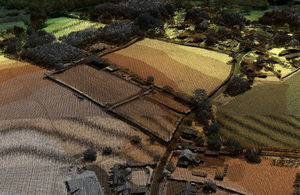Bubbling English wine boosted by new laser data
New laser mapping data is set to revolutionise the English wine industry.

Image of LIDAR mapping data
New laser mapping data is about to revolutionise the already booming English wine industry by helping growers identify new land to grow more and better quality grapes, Environment Secretary Elizabeth Truss announced today.
The recent release of 3D LIDAR maps, produced by the Environment Agency, will help growers better understand the tiny variations in slope and aspect of their land. When used in combination with other data, growers will be able to pinpoint the best location to plant vines that will thrive.
Experts estimate that an additional 75,000 acres of land across the country – equivalent to the Champagne region in France – is prime for grape growing and could be exploited by new-comers seeking to join the award-winning ranks of internationally acclaimed English wines such as Ridgeview Wine and Camel Valley.
To celebrate the end of another successful grape harvest, Environment Secretary Elizabeth Truss visited the Bolney Wine Estate in Haywards Heath, West Sussex, today to see how these new data will help growers choose the best spots for new vineyards.
She said:
There has never been a more exciting time for the English wine industry. Production has doubled in the last five years, chalking up an estimated retail value of £82 million, and by using cutting-edge technology such as precision viticulture our hard-working grape growers are now producing some of the best wine in the world.
By opening up our extensive data vaults we will further grow this important industry. LIDAR is just the beginning of the biggest government data giveaway the country has ever seen, giving the industry the tools it needs to grow.
Our goal is for English wine producers to have more knowledge than ever before so they can identify the best land, methods and time of the year to plant and grow and to make sure this industry continues to be a world-leader.
The extensive LIDAR archive – which contains 11-terabytes of information, equivalent to 2,750,000 MP3 songs, and covers most of England – was originally used by the Environment Agency to plan flood defences and analyse land use.
It was released last month under the #OpenDefra project, which will see 8,000 datasets made publically available in the next year, so that commercial industries and members of the public can use it free of charge.
Sir Philip Dilley, Chairman of the Environment Agency, said:
This data can give unique information about a landscape that can be useful for all kinds of applications. For example, when deciding where best to plant vines, the data can provide a vital insight into the terrain to identify ‘frost hollows’ and badly-drained areas that adversely affect vines.
Making our LIDAR surveys available as Open Data gives entrepreneurs, businesses, and local communities new opportunities to grow our thriving rural economy.
LIDAR is the first of a number of datasets that will be released by Defra in the coming months to help grow the wine industry. From data on soil chemistry and ground water measurement to information on water supplies and localised microclimates, these planned data releases will support an industry already at the forefront of technology.
Steve Wilkinson, Head of Data Services at the Joint Nature Conservation Committee said:
We are entering an age where all sectors – government, commercial and research – will need to work much more closely together to protect and get the best out of our environment. While the tools and techniques for analysing data become ever more powerful, it is making data more accessible that really makes the difference.
The #OpenDefra campaign creates a real step change and it is fantastic that we are already beginning to see the opportunities that it will bring. We’re looking forward to helping identify and realise the potential applications across a broad range of users.
The area of planted vineyards has increased by over 140% in the last 10 years, and with around 500 vineyards in England and Wales covering some 4,500 acres, this year’s grape harvest will mark another successful vintage for our producers.
The food and drink sector is worth £103 billion a year to our growing economy, employing around 1 in 8 people.
Sam Linter, Managing Director at Bolney Wine Estate said:
The English wine industry is at a very exciting stage of growth and in 2006 we received a grant from Defra that enabled us to build a state of the art winery, using new and innovative winemaking technology. This allowed us to grow our business, offering contract winemaking services and making far superior wine than ever before.
Now thanks to multiple award wins the reputation for the quality of our wine is at an all-time high and demand is growing year on year – we’re expanding into the export market and we currently sell into Japan, Switzerland, Belgium and Germany. The 2015 harvest is looking very promising for us and we expect to produce around 140,000 bottles this year.